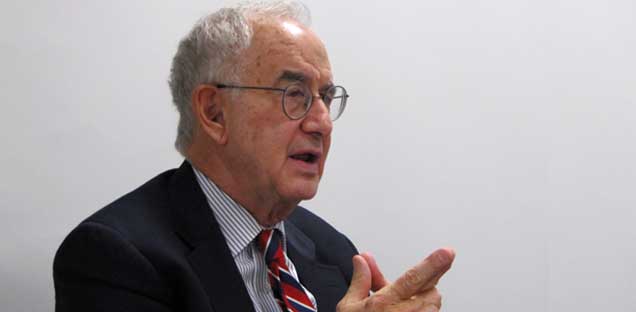February 3, 2015 — Peter D. Hart, chairman of Hart Research Associates, a polling firm that provides polls for NBC News and The Wall Street Journal, provided an analysis of current public opinion and the implications for the 2016 presidential election.
Public sentiment is more upbeat than it has been in recent years, as Hart demonstrated with data from the Michigan Consumer Sentiment Index, where consumer confidence surpassed 85 points for the first time in years. Across age groups and genders, more people are satisfied with the economy than they were one year ago, and Obama’s job rating has improved as well, said Hart.
Hart discussed priorities for Republican, Democratic, and Independent voters, as reported in a recent NBC News/Wall Street Journal poll. Although “defeating ISIS” and “creating jobs” were highly important for people of all political affiliations, the importance of other issues such as healthcare, increasing the minimum wage, and income inequality varied drastically along party lines. “This sets the agenda for… where things are going to head” for 2016, said Hart.
Despite the recent upswing, Hart sees another story on the ground – one where Americans are fed up with government, particularly Congress. He recounted a focus group conversation he had with a woman named Jenny, who he pegged as a Republican based on her voting record. “Then I said, ‘you can spend an hour with any one candidate. Who would you like to spend an hour with?’ And her choice was: Elizabeth Warren.” She was “furious with Boehner,” for being out of touch with the plight of the long-term unemployed, whose ranks included her husband, said Hart.
Jenny represents “the anger in the middle class, what they’re going through, and the sense that everything’s stacked in Washington’s favor, and is stacked against them,” said Hart. “Jenny is a great example of what the Republicans are going to be facing in 2016 — it’s not as simple as left and right.”
One Republican that came out of the session in “good shape” was Rand Paul. “There was something about him that people liked and thought was interesting,” said Hart. They “didn’t have much use for” Mitt Romney, Chris Christie, or Jeb Bush.
Hart cautioned against the use of polls at the beginning of 2015. “Looking at who’s ahead in the Republican primary – that all switches around in a minute’s notice. The key is being able to look to say, who has a theme, who has something that they’re going to say to the country?” said Hart. He projected that safety from terrorism and economic security will be the dominant issues for 2016.
Based on historical analysis, Republicans might have an advantage in 2016. Since 1958, the sixth year of a two-term presidency has given “a clue as to where we were leaning coming out of a two-term president,” said Hart, with Republicans being elected after a two-term Democratic president and vice versa. Obama has decided that he wants his legacy to be that of a “liberal-left president,” said Hart — which could lead the public to move toward the center.
Regarding voter turnout, Hart anticipated lower black voter turnout without a black candidate on a ticket, while for voters under 30, the important factor will be whether people feel that there’s a real difference between the two parties and their candidates.
Given the ongoing levels of public frustration, Hart said he believes there is potential for a third party candidate, but gerrymandering and the primary system gives the existing parties an overwhelming advantage.
“If you just had to pick at this stage of the game, the betting odds would have to be Hillary Clinton and Jeb Bush,” said Hart. “Would I bet? No.” Hart said while Bush is less established and more likely to be viewed in the shadow of his brother, Clinton is more likely to be seen as her own woman, and Bill Clinton will likely be an asset, not a liability. But, “if it’s not Hillary, it’s anybody’s guess.”
Download presentation slides (PowerPoint)
Article and photo by Nilagia McCoy of the Shorenstein Center.


